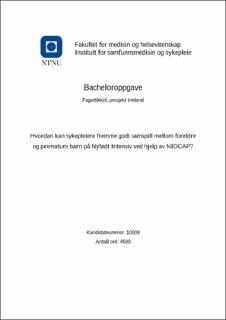Hvordan kan sykepleiere fremme godt samspill mellom foreldre og premature barn på Nyfødt Intensiv ved hjelp av NIDCAP?
Bachelor thesis
Permanent lenke
https://hdl.handle.net/11250/2672098Utgivelsesdato
2020Metadata
Vis full innførselSamlinger
Sammendrag
Sammendrag
Introduksjon Temaet i dette prosjektet omhandler premature barn på Nyfødt Intensiv, og hvordan sykepleiere ved hjelp av omsorgsmodellen NIDCAP kan fremme godt samspill mellom foreldre og premature barn. Dette prosjektet tar for seg utfordringer for sykepleierne og foreldrenes i et sykepleieperspektiv, og ser på hvilke faktorer som kan bedre samspill. Prosjektet er et samarbeid mellom St.Olavs Hospital og Norges Teknisk-naturvitenskapelige Universitet.
MetodeStudien er basert på et spørreskjema med bruk av både kvalitativ og kvantitativ metode delt ut på Nyfødt Intensivavdeling ved St.Olavs Hospital i perioden mars 2020. Totalt 31 informanter deltok. De kvalitative funnene ble analysert og fremstilt gjennom Excel, og analysemetoden til Dalland benyttet til de kvalitative funnene.
ResultaterFunnene kunne peke på at hovedtiltakene som kom fram på avdelingen bestod av god kommunikasjon, veiledning og inkludering av foreldre i pleie fra et tidlig stadium. Tidsmangel, å veilede foreldre i krise samt språkbarriere kom frem som hovedutfordringene på avdelingen. Funn tyder på samspillsfremmende tiltak utført på avdelingen, og et sterkt fokus på familiesentrert omsorg.
KonklusjonEt stort fokusområde blant de ansatte på avdelingen består av samspillfremmende tiltak og foreldreveiledning ved hjelp av omsorgsmodellen NIDCAP. Utfordringer knyttet til samspill som mangel på tid, veiledning til foreldre i krise, og språkbarriere er framtredende. Selv om majoriteten av sykepleierne i stor grad tar i bruk NIDCAP allerede, konkluderer studien med en anbefaling om å implementere omsorgsmodellen ytterligere i større grad, og øke bevissthet rundt de positive utfallene ved å følge denne metoden. Ønskelig med en ytterligere langtids-studie for å undersøke den faktiske virkningen av NIDCAP i et langtidsperspektiv sammenlignet med eksisterende forskning. Summary
IntroductionThe theme of this project is about premature babies at Newborn Intensive, and how nurses, using the NIDCAP care model, can foster good interaction between parents and preterm children. This project addresses challenges for the nurses and parents in a nursing perspective, and looks at which factors can improve interaction. The project is a collaboration between St.Olavs Hospital and the Norwegian University of Science and Technology.
MethodThe study is based on a questionnaire using both qualitative and quantitative method distributed at the Newborn Intensive Care Unit at St.Olavs Hospital during the period March 2020. A total of 31 informants participated. The qualitative findings were analysed and produced through Excel, and Dalland's method of analysis was used for the qualitative findings.
ResultsThe findings could point to the fact that the main initiatives that emerged in the department consisted of good communication, guidance and inclusion of parents in care from an early stage. Lack of time, counselling parents in crisis as well as language barrier emerged as the main challenges in the department. Findings suggest interaction-promoting measures carried out in the department, and a strong focus on family-centered care.
ConclusionA large focus area among the staff of the department consists of interaction-promoting measures and parental guidance using the care model NIDCAP. Challenges related to interaction such as lack of time, guidance to parents in crisis, and language barrier are prominent. Although the majority of nurses are already using NIDCAP to a large extent, the study concludes with a recommendation to further implement the care model and increase awareness of the positive outcomes by following this method. Desirable with a further long-term study to investigate the actual impact of NIDCAP in a long-term perspective compared to existing research.
